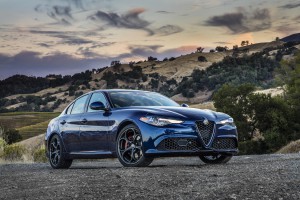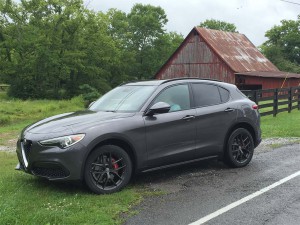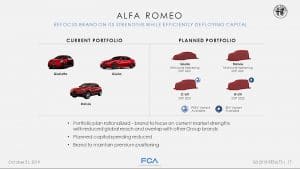
Fiat Chrysler is scaling back its plans for Alfa Romeo due to poor sales results. The move has some wondering about its fate in North America.
Little more than a year ago, the Alfa Romeo brand seemed poised to become one of the stars in the Fiat Chrysler Automobiles portfolio. At a well-attended event in Milan in June 2018, former FCA Chief Executive Sergio Marchionne positioned the Italian marque as one of four brands that would dominate the company’s future sales, along with Jeep, Ram and Maserati.
But, just hours after Fiat Chrysler confirmed plans to merge with France’s PSA, the late Marchionne’s successor, Michael Manley, sounded a much more sour note, raising concerns about Alfa’s future, particularly in the U.S. market where it has struggled to gain traction.
“I’ve not been happy with the performance of Alfa Romeo,” said Manley, who succeeded Marchionne in July 2018 after the former CEO’s unexpected death. “While I fundamentally believe in the brand, we must make sure any investments we make generate appropriate returns.”
(Image of Alfa Romeo’s 600hp GTV Coupe Leaks Out)
As part of the five-year plan announced in Milan last year, Alfa was set to see a significant expansion in its line-up which, at the time, consisted solely of the midsize Giulia sport sedan, the Stelvio SUV and, in some markets, the older Giulietta sedan. The expanded portfolio was to include a new sports car, among other things, and several SUVs, while there also were set to be two high-end halo cars:

FCA Chief Exec Mike Manley said he still believed in the Alfa brand, but said scaling back the line-up would help improve its profitability.
· An all-new Alfa Romeo 8C adopting a carbon fiber body and platform. It was slated to deliver more than 700 horsepower through a hybrid drivetrain pairing a mid-mounted twin-turbo gas engine and an electric motor driving the front axle. Expected 0 to 100 kmh time? Under 3 seconds; and
· A new Alfa GTV reviving one of the brand’s legendary nameplates. The four-passenger model would make over 600 horsepower using an electrically boosted gas engine. Power would be delivered to all four wheels and the GTV will feature torque vectoring.
But Manley, during his Thursday morning earnings teleconference, said that, “in the near term, the new portfolio for the brand is significantly scaled back with a corresponding reduction in capital spending.”
Equally significant, Manley also stressed that Fiat Chrysler plans to “refocus the portfolio of actions for the brand to segments and geographies where we have successfully competed.”
That could spell trouble for the brand’s future in the U.S., at least one veteran analyst, speaking on background, cautiously wondering if Alfa might vanish from the market – again. Along with a number of slow-selling European brands, the Italian marque left the States in the early 1990s. It tested the waters for a return in 2008 with the debut of the limited-run 8C Competizione supercar but didn’t make a serious comeback attempt until 2015 with the launch of the little 4C roadster.
(Alfa Romeo Signals Plug-In Plans With Tonale Concept)
That was followed by the Giulia and then the Stelvio, Alfa’s first SUV, and initially perked U.S. demand which grew from 12,031 in 2017 to 23,800 a year later. But demand has been falling off sharply in 2019, American dealers selling just 9,037 Alfas during the first half of the year, compared with 12,265 during the same period in 2018.
“They have given it a good try,” said Carla Bailo, CEO of the Center for Automotive Research in Ann Arbor, Michigan. “But they just can’t keep doing the same thing if they can’t return a profit.”
The Giulietta will go away as part of the rationalized product line-up, Manley revealed Thursday. And, beyond the bigger Giulia and Stelvio, Alfa will now get only two more products, a compact SUV and an even smaller utility vehicle.
“I believe these actions will allow the brand to return to profitability,” he said during his morning call. But he quickly added that, “While there are no product actions beyond what you see here, obviously I wouldn’t rule out that possibility in the future depending upon the performance.”
While none of the industry observers who spoke to TheDetroitBureau.com – mostly on background – saw the Alfa brand going away, CAR’s Bailo stressed that all bets are off when it comes to what products and brands will survive “after the merger with PSA.”
She expects the combined company – which will see PSA CEO Carlos Tavares retain the chief executive role – to give a serious look at its entire portfolio. That could put virtually everything at risk, including the flagship Fiat and Chrysler brands that were left with relatively few products to market, anyway, under Marchionne’s five-year plan.
(FCA Pledges $5.7B Investment in Italian Auto Plants)
But Alfa will have to build up some momentum or it, too, could face a very uncertain future.



Current build quality, reliability, but most important memories of past build quality and reliability have really sealed Alfa’s fate.
Unfortunately most want the “hot chick” but expect practicality / reliability of a stereotypical grandmother.
Manley does not have Alfa Romeo at his heart. It is sadistic to allow a CEO to allow a brand with over 100years of history fall. Get your act together man!!!! and get after-sales service right, and ensure that quality is on par or higher, and provide a larger range, not reduce, and include those on a limited budget, and the young , cater for a wider market, and change the minds of motoring journalists who, on every occasion, diss the brand about quality, every – single- time- continue to knock the brand for a reputation of poor reliability and iffy quality, when Alfa Romeo sends a Giulia QF out to the press and a unit is sent out without software upgrades and the journos have a feast day dissing the brand as the dash lights up brighter and flicker some like an xmass tree on viagra, that, FCA, has a huge negative- ‘stay the F away’ from Alfa Romeo, impact on the minds of the public. That person/s should have been fired. I want to remind those making the decisions, it is not the Alfa Romeo brand to blame, it is the decisions a hand full of people who are to blame. The guilt lies with you- the decision-makers, low energy individuals at FCA. Get your act together and get the brand together, do what you are being paid to do. Satisfy and impress the public, journos and shareholders!!!! It’s so easy to kill the brand, dust your hands and walk away, that my friends, is a sign of immense weakness and disinterest, employ the right people who are motivated and energized to do the job at hand correctly, the first time, every time. Take a feather out the hat of what Audi, to name but just one brand, what they accomplished as an example, the brand went from ‘meagre’ some 20 years back, today, they are a leading marque, why? the decision was taken to embrace the brand and get the quality up on every scale against there opposition, right down to the smallest, yet very important , touch and sound of items like the electric window button, today, they are respected and achieved what they set out to do and continue to ride the wave of success that they set out to do. FCA, I’m afraid, has not put their heart fully into the Alfa Romeo marque and embrace it. That drive died when the late and great Mr Marchionne passed away. As an Alfisti I have supported the brand and Fiat since my first car in 1988, I am disgusted and deeply saddened to read this story today. Rid the company of the ‘do nothing’ and ‘low energy’ heads, not the brand. And reap the positive rewards. That’s my rant for 01 November 2019, Signing out. Kenneth Petzer from South Africa